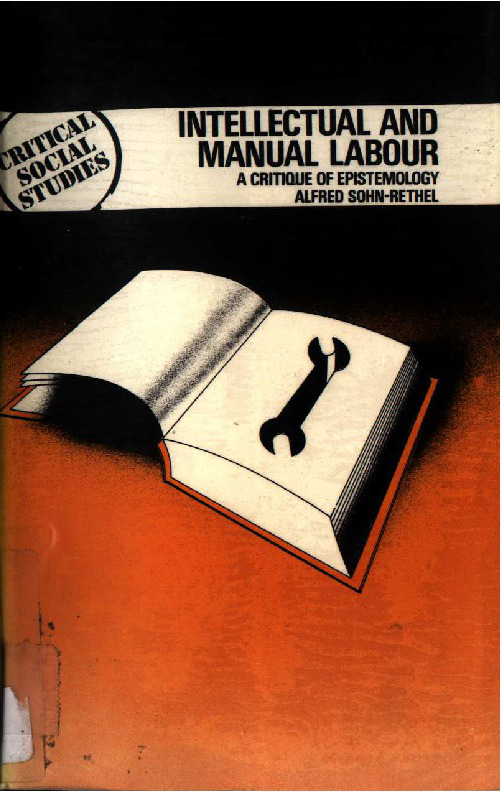Alfred Sohn-Rethel: Intellectual and Manual Labour: A Critique of Epistemology (1970–) [DE, EN, ES, PT]
Filed under book | Tags: · capitalism, commodity fetishism, economics, epistemology, Frankfurt school, knowledge, labour, marxism, philosophy, production, real abstraction, value

In this book, the economist and philosopher Alfred Sohn-Rethel attempts to “establish the relationship between the capitalist commodity form and the origin of the distinction between manual and intellectual labor. His theory of knowledge is constructed after an elaborate consideration and criticism of two schools of thought. On the one hand, he criticizes the effort of bourgeois science to assert the independent nature of science and to formulate ahistorical laws of the development of knowledge in terms of non-empirical, metaphysical characteristics of Reason. On the other hand, he also challenges orthodox Marxist theories of ideology in which knowledge is viewed as mechanistically derived from activity in the economic base.” (from a review by Gilda Zwerman, Theory and Society, 1982)
German edition
First published by Suhrkamp, Frankfurt am Main, 1970
Revised and expanded edition published by VCH, Weinheim, 1989
ISBN 352717690X
226 pages
via discofiasko
English edition
Publisher Macmillan, 1978
ISBN 0333230450
216 pages
via jlw
Commentary: Alberto Toscano (2005), N Pepperell (2007), David Black (2009), David Black (2013), Joseph Belbruno (2012), Ross Wolfe (2014).
New English edition in preparation
Geistige und körperliche Arbeit (German, revised ed., 1970/1989)
Intellectual and Manual Labour (English, 1978, 7 MB, OCR’d version added on 2014-5-4 via Marcell Mars)
Trabajo intelectual y trabajo manual (Spanish, 1979)
Trabalho espiritual e corporal (Portuguese, trans. Cesare Giuseppe Galvan, HTML, undated, unpaginated)
transversal, 01/13: The Languages of the Banlieues (2013) [EN, DE, FR, Arabic]
Filed under journal | Tags: · capitalism, cognitive capitalism, geopolitics, knowledge, knowledge production, labour, theory
“The crises within cognitive capitalism and cognitive labor are mirrored in the reproduction and exacerbation of global divisions of labor and the emergence of new forms of exploitation as part of a regime of flexible capital accumulation. While drastic austerity measures and heightened control mechanisms lead to a radical transformation of the welfare state on the one hand, new networks of communication, struggle and alternative forms of knowledge emerge on the other.
This issue of transversal attempts to review some of the general assumptions of a theory of cognitive capitalism and to unsettle the very notions of knowledge and its production, discussing the conditions of its capture, its “re-invention” and its capacity for creating worlds. The individual essays follow the lines of a (post-)colonial historicity and a feminist and geopolitical critique of capitalist valorization, thereby questioning the materiality of knowledge and its production in relation to resources and bodies, as well as how art and knowledge production are interwoven with political struggles.” (Editorial)
With contributions by Anne Querrien, Marc Hatzfeld, Amina Bensalah/Myriam Suchet, Boris Seguin, Sonia Chikh (Les engraineurs), Abdoulah Bensaid (Musik à Venir), Françoise Dibotto Soppi.
Editors: Lina Dokuzović, Therese Kaufmann, Raimund Minichbauer, Radostina Patulova
Publisher eipcp – European Institute for Progressive Cultural Policies, Vienna/Linz
Copyleft
ISSN 1811-1696
HTML (updated on 2020-4-18)
Previous issue
transversal, 01/12: Unsettling Knowledges (2012) [EN, DE, FR, ES, HI]
Filed under journal | Tags: · capitalism, cognitive capitalism, knowledge, knowledge production, labour, politics
“The crises within cognitive capitalism and cognitive labor are mirrored in the reproduction and exacerbation of global divisions of labor and the emergence of new forms of exploitation as part of a regime of flexible capital accumulation. While drastic austerity measures and heightened control mechanisms lead to a radical transformation of the welfare state on the one hand, new networks of communication, struggle and alternative forms of knowledge emerge on the other.
This issue of transversal attempts to review some of the general assumptions of a theory of cognitive capitalism and to unsettle the very notions of knowledge and its production, discussing the conditions of its capture, its “re-invention” and its capacity for creating worlds. The individual essays follow the lines of a (post-)colonial historicity and a feminist and geopolitical critique of capitalist valorization, thereby questioning the materiality of knowledge and its production in relation to resources and bodies, as well as how art and knowledge production are interwoven with political struggles.”
With contributions by Lina Dokuzović, Silvia Federici, Encarnación Gutiérrez Rodríguez, Therese Kaufmann, Christian Kravagna, Brigitta Kuster, Sandro Mezzadra, Walter Mignolo, Raimund Minichbauer
Editors: Aileen Derieg, Lina Dokuzović, Marcelo Expósito, Therese Kaufmann, Raimund Minichbauer, Radostina Patulova, Gerald Raunig
Publisher eipcp – European Institute for Progressive Cultural Policies, Vienna/Linz
Copyleft
ISSN 1811-1696
HTML (updated on 2020-4-18)
Comment (0)
